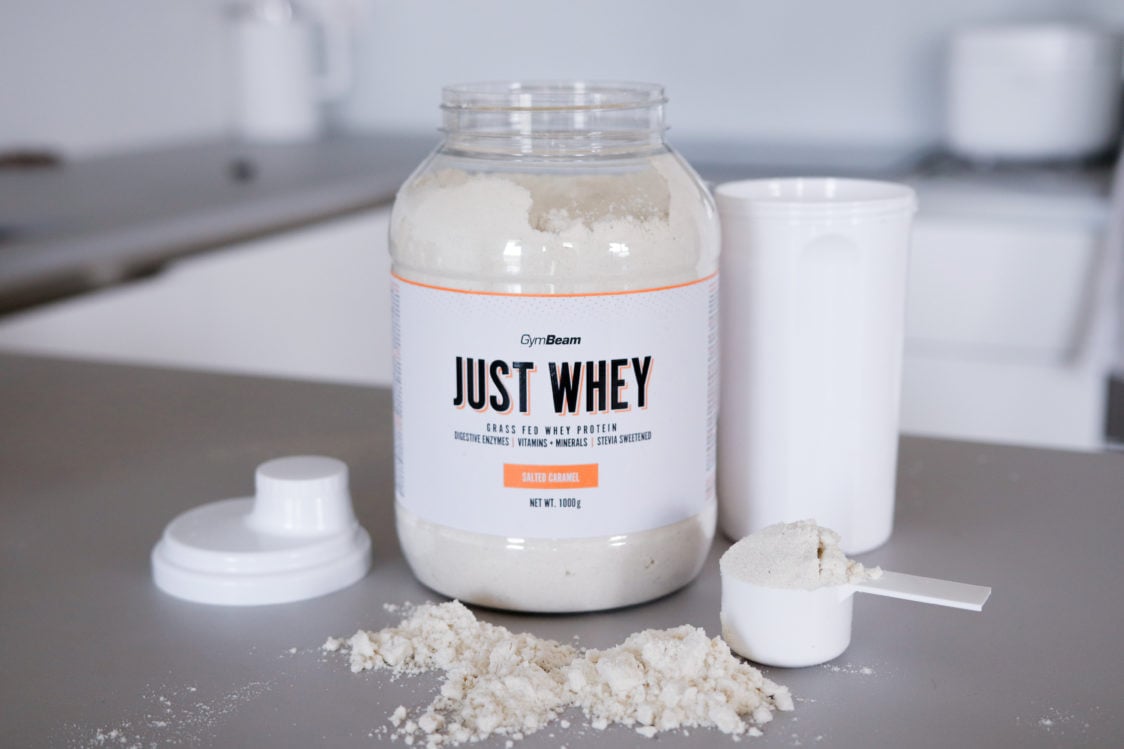Table of Contents
Most people think of whey protein as a powder that athletes mix with water and drink after exercise to “grow muscles”. This is of course true, but fewer people know that this notion significantly underestimates what whey protein can do. Not only can it be useful for people who don’t exercise, but it also has a large number of health benefits. In today’s article, you will learn what they are.
What is whey protein?
Whey is a liquid that is produced as a waste product during the production of cheese. It contains whey proteins, which make up roughly 20% of the milk protein content. The remaining 80% of proteins in milk are casein proteins. By adding enzymes to the milk, the casein turns into a solid form, the whey remains, and then, through other gentle technological processes, whey protein is formed. [16]
Types of whey protein
There are three types of whey protein, and each of them differs in taste, absorbability, but also in the content of protein, lactose or fat.
- Whey Protein Concentrate (WPC): This type of whey protein is the best-known and best-selling. It usually contains 70-80% of protein, approx. 3% of fat and 4-6% of lactose.
- Whey Protein Isolate (WPI): The isolate is made from the above-mentioned concentrate, which undergoes further filtration. The result is a higher proportion of protein (80% or more) and a smaller proportion of fat and lactose. This type of whey protein is mainly appreciated, for example, by those who have difficulty digesting lactose or athletes who are looking for the purest possible source of protein.
- Whey Protein Hydrolysate (WPH): Hydrolysate is produced by various processes that break down long protein chains into smaller sections (peptides). This makes the hydrolysate quickly digestible. The protein content is 70-85%. [15]
If you are interested in more detailed information about the types of whey protein, read our article entitled Which Protein to Choose? Whey Concentrate, Isolate or Hydrolysate?

Health benefits of whey protein
1. It supports the growth and maintenance of muscle mass
Whey protein is one of the highest quality protein sources. It contains all essential amino acids (EAA), i.e. those that our body cannot produce by itself, but must receive them through food. If there is not enough EAA in the diet, the body cannot create all the necessary proteins for the production of hormones, immune cells or muscle mass. [14]
What is the quality of whey protein?
Protein quality is evaluated, for example, by using the Amino Acid Score Method (AAS), which compares the content of essential amino acids in the observed protein with the so-called reference protein defined by the World Health Organization (WHO). A slightly more accurate method is the so-called PDCAAS (Protein Digestibility-Corrected Amino Acid Score), which also takes into account protein digestibility. Whey protein has a score of 1, which is the highest possible value. [3,6]
Whey protein is rich in quickly absorbable Branched-Chained Amino Acids (BCAAs). A particularly important role is played by the amino acid called leucine, which triggers the formation of muscle proteins (proteosynthesis). Proteosynthesis is best stimulated by a dose of 20-40 g of protein, which should contain 1-3 g of leucine. If you want to achieve growth of muscle mass, an increase in protein intake alone may be sufficient in the beginning. However, combining this with strength training is much more effective (and necessary for a significant muscle growth). [5,13]
Whey protein is beneficial for everyone including non-athletes
The regular consumption of whey protein can also be appreciated by people who are trying to maintain muscle mass while losing weight or older people who are at risk of losing it faster. Proteins are essential for maintaining muscle mass in old age, and their sufficient intake ensures better body function and quality of life. Whey protein, which is easily digestible and significantly stimulates proteosynthesis, can serve as an aid to elderly people in the fight against sarcopenia (loss of muscle mass and muscle strength that worsens with increasing age). [2]
If you want to turn protein into a hearty snack with a higher energy value, you can mix it with milk or, for example, a plant-based drink (rice, oats, etc.). However, if you drink whey protein after sports activity, it will be more beneficial to mix it just with water. You can read more about it in the article Is It Better to Drink Protein Shake with Water or Milk?

2. It has a high satiating capacity and reduces appetite
Proteins have the highest satiating ability compared to fat and carbohydrates. However, whey protein causes an even higher feeling of satiety than other protein sources (meat, legumes, etc.). Feelings of hunger and satiety are not only affected by the fullness of our stomach, but also by hormones that are released as a reaction to food intake. Protein consumption promotes the release of stomach peptides, such as cholecystokinin or GLP-1 (glucagon-like peptide 1), which induce a feeling of satiety. [9,12]
The high content of branched-chain amino acids and their rapid absorption probably have an effect on the faster induction of satiety after consuming whey protein compared to other protein sources. [9]
You might be interested in these products:
3. It is a good friend when losing weight
When you are trying to lose weight, every little thing that helps you endure the reduced diet is useful. As explained earlier, whey protein has several properties that make it a suitable food for a diet.
- Thanks to its high satiety and appetite–reducing effects, it can help you maintain a reduced energy intake without worrying about getting hungry.
- When losing weight, there is a risk of losing both fat and muscle mass. Whey protein not only helps to maintain muscles, but also supports their growth.
- The higher the proportion of muscle mass you have, the higher your basal metabolism (the amount of energy you need just to maintain basic vital functions).
- Proteins also have the largest thermic effect of all macronutrients (15-30%), which means that, during their digestion, the largest amount of energy is consumed. When you consume 100 kcal in the form of protein, up to 15-30 kcal are burned during digestion. A higher proportion of protein in the diet thus increases the energy expenditure. However, remember that a varied and balanced diet containing all macronutrients (carbohydrates, proteins, fats) is important. [11]
Our article How to Choose the Best Protein for Weight Loss will help you choose the right protein for your diet.

4. It supports immunity
Sufficient protein intake is the basis for the proper functioning of the immune system, since just like muscle cells, immune cells and other components of the immune system are made of proteins. Whey protein is a source of high-quality proteins and all the aforementioned essential amino acids.
However, whey protein is not only beneficial for immunity as a building material, but also has various immunological effects. Immunoglobulins protect the body from viruses and bacteria and, for example, neutralize toxins. β-lactoglobulin, which is the protein that makes up the largest part of proteins in whey (55-65%), can support the formation of immune cells in the spleen. α-lactalbumin peptides influence the function of immune B and T cells. [1]
5. It has antioxidant effects
With regular consumption of whey protein, the body’s health can be supported by its antioxidant effects. Antioxidants destroy and neutralize free radicals, which in excessive amounts damage cells and cause oxidative stress. This increases the risk of developing cancer, atherosclerosis, diabetes or other diseases. In whey protein, several bioactive substances have an antioxidant effect, such as lactoferrin or lactoperoxidase. Whey protein also supports the activity of glutathione peroxidase, which is one of the most important antioxidant systems in the body. [4,7,14]
Lactoferrin also has an antimicrobial effect (mainly antibacterial) thanks to its ability to bind iron in harmful (pathogenic) microorganisms and thus prevent their reproduction. [4,8]

6. It can help lower blood pressure
In case of high blood pressure (hypertension), one of the treatment options is the use of the so-called ACE inhibitors, which prevent blood vessels from narrowing. ACE inhibitors suppress the function of the so-called angiotensin-converting enzyme (ACE), which contributes to the contraction of blood vessels.
Various peptides, such as α-lactalbumin, β-lactoglobulin or BSA (Bovine Serum Albumin), act as ACE inhibitors in whey protein. Regular consumption of 20 g of whey protein can have a very positive effect on lowering blood pressure. [10]
7. It can help lower blood sugar levels
Not only carbohydrates, but also proteins cause the secretion of insulin, which is a hormone that lowers blood sugar levels (Glycaemia). Since whey protein is quickly absorbed, the increase in insulin levels is faster after its consumption than after other sources of protein. Thanks to this, whey protein helps to reduce the blood sugar levels after eating. It can thus be beneficial for people with diabetes mellitus type 2 (DM2), as well as for healthy people who would like to prevent this disease. [10]
Adding protein powder to food (for example, whey protein to oat porridge) slows the absorption of carbohydrates into the blood. It is also beneficial for healthy people who don’t suffer from diabetes, because after a meal rich in carbohydrates, blood sugar levels of every person will increase. The more and faster it rises, the faster it will fall, which can cause hunger and cravings for sweets. By combining carbohydrates with proteins you can easily prevent these cravings.

When to drink whey protein powder?
- It can be used it in situations where a higher protein intake is needed. In a reduction diet, when gaining muscle mass or in case of diseases, basically any time it is necessary to increase the amount of protein in the diet. It is also suitable for the diet of older people who are trying to maintain their muscle mass.
- It is a suitable protein supplement when, for any reason, you cannot take it in the form of solid food.
- Whey protein can also be a suitable substitute for solid food when you don’t have time and need to drink your meal, or when you can’t consume solid food for various reasons.
- Last but not least, due to its good digestibility, whey protein can be appreciated by people suffering from various digestive problems (not related to the consumption of milk and milk proteins).
To learn more about other types of animal and plant-based proteins, read our article How to Choose the Right Protein for Weight Loss or Muscle Growth?
What should you remember?
Whey protein is a great food supplement that has its place not only in the diet of athletes. For people who are trying to lose weight it can help maintain muscle mass and at the same time make the diet easier by inducing a greater feeling of satiety. Both athletes and non-athletes can use whey protein in their diet to benefit from its positive effects on muscle mass growth, but also on blood pressure, immunity or blood sugar levels.
Is whey protein yet to become a part of your regular diet? If the article was useful for you and you learned something new, share it with your friends and spread the word about the health benefits of whey protein.
[1] BEAULIEU, J. et al. Whey proteins and peptides: beneficial effects on immune health. In Therapy . 2006. Vol. 3, no. 1, s. 69–78.
[2] CAMARGO, L. da R. et al. Whey protein ingestion in elderly diet and the association with physical, performance and clinical outcomes. In Experimental Gerontology . 2020. Vol. 137, s. 110936.
[3] EUROPEAN FOOD SAFETY AUTHORITY Scientific Opinion on Dietary Reference Values for protein. In EFSA Journal – http://onlinelibrary.wiley.com/doi/10.2903/j.efsa.2012.2557/epdf
[4] HAO, L. et al. Lactoferrin: Major Physiological Functions and Applications. In Current Protein & Peptide Science . 2019. Vol. 20, no. 2, s. 139–144.
[5] JÄGER, R. et al. International Society of Sports Nutrition Position Stand: protein and exercise. In Journal of the International Society of Sports Nutrition . 2017. Vol. 14, no. 1, s. 20.
[6] World Health Organization. JOINT FAO/WHO/UNU EXPERT CONSULTATION ON PROTEIN AND AMINO ACID REQUIREMENTS IN HUMAN NUTRITION. – https://apps.who.int/iris/handle/10665/43411
[7] KHAN, I.T. et al. Antioxidant properties of Milk and dairy products: a comprehensive review of the current knowledge. In Lipids in Health and Disease . 2019. Vol. 18, no. 1, s. 41.
[8] LEGRAND, D. Overview of Lactoferrin as a Natural Immune Modulator. In The Journal of Pediatrics . 2016. Vol. 173 Suppl, s. S10-15.
[9] MOLLAHOSSEINI, M. et al. Effect of whey protein supplementation on long and short term appetite: A meta-analysis of randomized controlled trials. In Clinical nutrition ESPEN . 2017. Vol. 20, s. 34–40.
[10] PAL, S. - RADAVELLI-BAGATINI, S. The effects of whey protein on cardiometabolic risk factors. In Obesity Reviews . 2013. Vol. 14, no. 4, s. 324–343.
[11] PESTA, D.H. - SAMUEL, V.T. A high-protein diet for reducing body fat: mechanisms and possible caveats. In Nutrition & Metabolism . 2014. Vol. 11, s. 53.
[12] RIGAMONTI, A.E. et al. Whey Proteins Reduce Appetite, Stimulate Anorexigenic Gastrointestinal Peptides and Improve Glucometabolic Homeostasis in Young Obese Women. In Nutrients . 2019. Vol. 11, no. 2, s. 247.
[13] TANG, J.E. - PHILLIPS, S.M. Maximizing muscle protein anabolism: the role of protein quality. In Current Opinion in Clinical Nutrition & Metabolic Care . 2009. Vol. 12, no. 1, s. 66–71.
[14] YALÇIN, A.S. Emerging therapeutic potential of whey proteins and peptides. In Current Pharmaceutical Design . 2006. Vol. 12, no. 13, s. 1637–1643.
[15] “What’s the best protein powder?” Your complete guide to choosing the right supplement for you. – https://www.precisionnutrition.com/how-to-choose-protein-powder
[16] Whey Protein: Health Benefits and Potential Side Effects. In Cleveland Clinic [https://health.clevelandclinic.org/is-whey-protein-good-for


Add a comment